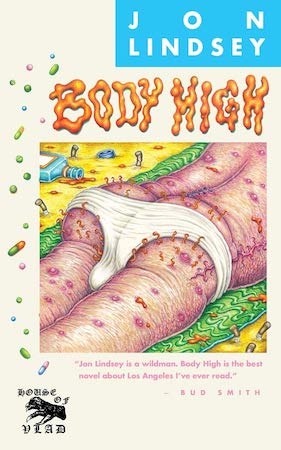Years ago, when I worked at a hospital on the east side of Manhattan, I covered midnight shifts a few nights a month. I was often stationed in the pharmacy clean room and would spend the night alone in this cold, sterile room mixing intravenous medications—it was all needles and syringes, vials and fluid transfer, though I often tried to imagine who’d receive these late-night drips to keep from crashing, or wondered if they’d survive, and the countless bodies and veins these meds would be infused into. Listening to music was another way I’d deal with the solitude and sleeplessness. I had specific soundtracks for the overnight to keep me alert and amused. Songs like The Fall’s “Mr. Pharmacist,” with its raucous playfulness and subversion, I’d listen to on repeat.
I’ve been a licensed pharmacist for as long as I’ve been hustling as a writer, which at this point is basically twenty years. Give me a book that delights in pharmaceuticals, confronts pharmacy’s peculiar place within the medical system, or that subverts the pharmaco-industrial complex. We’re a society where the healthcare industry is omnipresent—where medical debt is the leading cause of personal bankruptcy but also accounts one-fifth of our nation’s economic value. Or consider: the U.S. has 5% of the world’s population but we consume nearly 80% of the world’s opiates.
With my debut novel, The Enhancers, I attempted to depict the pleasures and consequences, intended and unintended, from the vast array of supplements not only available everywhere and on demand, but that were also used to mitigate any discomfort. I wanted to show the challenges of coming of age and thinking within this system not so distant from our own, by writing about the friendship of three teenage girls.
When Mark E. Smith of The Fall sings, “Mr. Pharmacist! Can you help me out today?” he’s not asking for book recommendations. He’s asking for help dealing with his condition, being human in this world, and while I can’t dispense any drugs to assist you, dear reader, with this, I can provide a reading list of books I’ve encountered, read, and collected that speak to pharmaceuticals and the pharmaco-industrial complex in myriad ways.
Naked Lunch by William Burroughs
I first encountered William Burroughs’ Naked Lunch the summer Natural Born Killers was released; it was also the summer I first watched Drugstore Cowboy. The pharmacists didn’t fare well in any of these drug tales and fantasies: they were stand-ins for rule-keepers, the man, the sad solitary third shift employee at the 24-hour drug store. Naked Launch was my first encounter with William Burroughs, who was next level for the Beats. Drugs, chemicals, and addiction are the everything here, and the writing, while cultural satire, is also on point. It’s not a soft book, or an easy book, and it’s never one that I can take in one full gulp—but it’s fiercely intelligent and provides a searing vision of American culture that remains relevant.
Testo Junkie by Paul B. Preciado
Written before he transitioned, Paul B Preciado’s Testo Junkie documented the way they subverted gendered binaries of male and female, while experimenting with testosterone gel, using it every day for a year. Part performative drug diary, part theoretical text, part autofiction— I’d never read anything like it or so empowering with regard to pharmaceutical play and performance. As Preciado writes, “We are being confronted with a new kind of hot, psychotropic punk capitalism,” an idea they tease out with their neologism, the “pharmacopornographic,” i.e., “a bimolecular (pharmaco) and semiotic-technical (pornographic) government of sexual subjectivity—of which ‘the Pill’ and Playboy are two paradigmatic offspring.” I loved this book when I first read it ten years ago, and it’s still fresh in its use of T to experiment, explore embodiment, and subvert gender identity.

Body High by Jon Lindsey
Jon Lindsey’s Body High is an instant classic on par with Denis Johnson’s Jesus’ Son, updated for and transplanted to 21st-century L.A. While Body High is not a book about drugs per se, drugs are rife from the first page—at the narrator’s mother’s funeral no less—and provide the basis for a series of escapades fueled by grief and loss and ennui. It’s a remarkably tender, charming, and disarming book. Not long before Tyrant Books’ Gian DiTrappano died, he called Body High the best book he’d read that year, and compared Lindsey to a budding Sam Lipsyte, but L.A. style and with a voice all his own. I can vouch for this. Read it.
A History of Present Illness by Anna DeForest
“Everything we did was studied, written up, and published in peer-reviewed journals. The whole school was rich with projects to prove that doctors could be made humane,” so states the unnamed narrator near the beginning of Anna DeForest’s novel, A History of Present Illness. The novel opens with the narrator entering medical school as she’s ceremoniously given her white coat, and then it continues to follow her heartfelt and blunt gaze through the corridors, as witness to her indoctrination within the medical-industrial complex. The narrator’s gaze leads the reader through both the forced intimacy of working with bodies at the boundaries of life and death—the humiliation and conditioning. Told in episodic accounts, the narrative touches upon so many quandaries, questions, and wrongs, like the ways surgeons are known to for mocking patients and permitting abuses like allowing pelvic exams on sedated female patients, or by recalling the barefaced way semantics were employed to justify the denial of penicillin to Tuskegee syphilis patients, by the then-head of the CDC; he “stressed that patients weren’t denied lifesaving drugs, they just weren’t offered any.”
The Nature of Drugs by Alexander Shulgin
Alexander “Sasha” Shulgin’s Nature of Drugs is the closest I can get to recommending you go read a pharmacology text. Shulgin’s lecture is from his class of the same name, taught at San Francisco State University in the late ‘80s. The lectures are contextually somewhat dated but Shulgin is brilliant—a pioneer chemist and independent thinker who was fearless in his exploration of psychoactive drugs. The Nature of Drugs is an accessible and interesting primer which also considers the inane sources of many of our drug laws. Shulgin gives lesser-known anthropological and historical contexts for chemical use and manufacture, too. Consider, for example, that Dolophine (methadone) was created during WWII because of Germany’s limited access to natural opiates and named for Adolph Hitler.
Oval by Elvia Wilk
The 21st-century dystopia borne of Utopian possibility in Elvia Wilk’s Oval paints a corporate-owned Berlin that sprouts its own scientific wonders of biodynamic housing and party drugs tailored to make users high on generosity. Oval at its core is about how humanitarian, ecologically friendly projects can be co-opted by corporate greed, and it provides incisive social critique, not just of corporate power but of class and hierarchy and the art world.
Idealists Anja and Louis live in a corporate-run housing experiment, an eco-housing collective built upon a fake mountain constructed over Berlin’s Tempelhof Field. Anja, a biologist in training, has been doing research in the Cartilage department of RANDI, working toward creating housing that one can grow from a petri dish, which could help solve Berlin’s housing crisis. Her partner Louis is a brand consultant and has been working secretly to create and market Oval, a drug that creates generosity in its users, and which Louis believes will solve inequality. No surprise that this ill-thought, corporate-backed experiment goes awry and ultimately wreaks havoc.
Attention! A Love Story by Casey Schwartz
Casey Schwartz first chronicled her Ivy League and post-grad love affair with Adderall for the New York Times—the way it made her feel so focused and as if she exceeded her own limitations of mind. The attraction to this seemingly heightened focus belongs not just Schwartz but has become a cultural quandary as we’re surrounded by devices designed to distract. Adderall’s allure, Schwartz finds, falls short of its seeming promise—in the end causing panic and standing in the way of meaningful engagement. Schwartz goes on to chronicle antidepressants by way of DFW and psychoactive drugs à la Aldous Huxley. In a conversation with Joshua Cohen (who also wrote a book on attention), Schwartz admits that part of her impulse in writing this book was the search for a lost, let’s say more idyllic, baseline.
The post 7 Books About the Pharmaco-Industrial Complex appeared first on Electric Literature.








